2016 NCAA D1 Outdoor ChampionshipsJun 7, 2016 by Dennis Young
The Six Juiciest NCAA Distance Storylines
The Six Juiciest NCAA Distance Storylines
We break down the distance races before NCAAs.
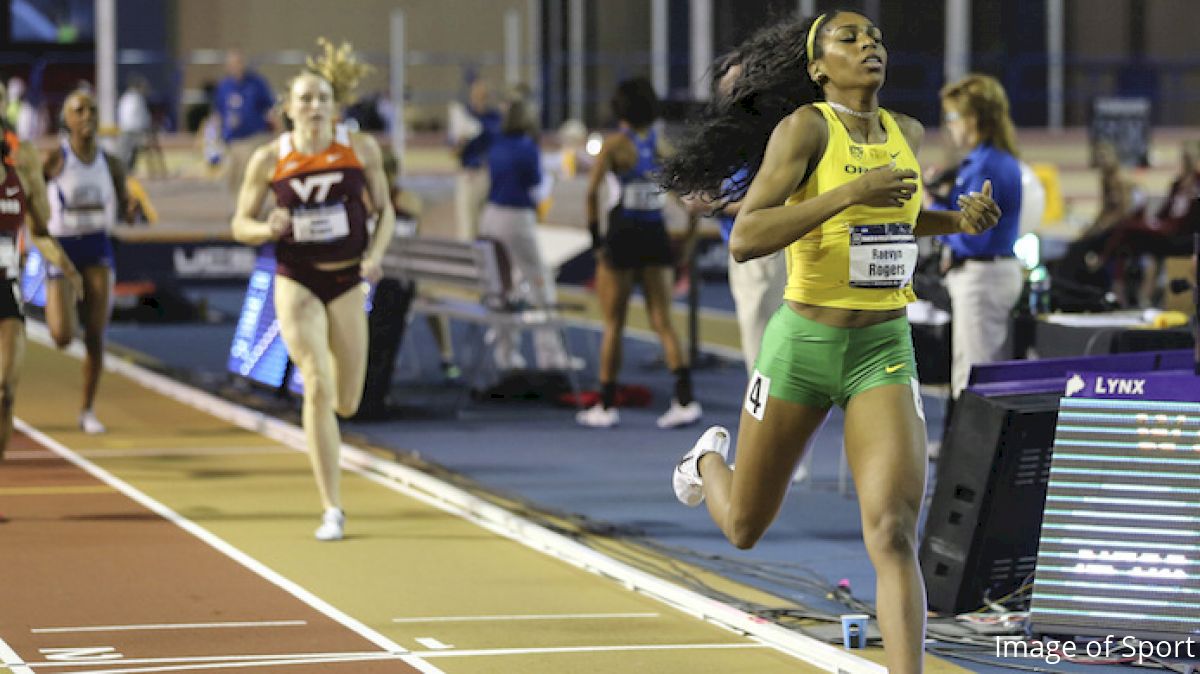
All race times Pacific.
1. Is Brandon McBride the track equivalent of the San Francisco Giants, or will Donavan Brazier become the Raevyn Rogers of 2016?
Men’s 800m, 6:47 Friday
McBride’s last five years:
2012: 1:46.07—the fastest 800 by a North American high schooler ever
2013: 11th NCAA indoor prelim, 33rd NCAA East Prelims
2014: NCAA indoor/outdoor champion
2015: 4th NCAA indoors, 6th NCAA outdoors
2016: 1:44.63 season best; No. 3 all-time collegian
Infamously, the Giants won the World Series in 2010, 2012, and 2014 while failing to make the playoffs in 2011, 2013, and 2015 (they’re in first so far in 2016). Could McBride be their track equivalent—only transcendently excellent in even years?
Texas A&M’s Donavan Brazier and BYU’s Shaquille Walker will look to make McBride wait until the next even year. Brazier, a freshman, ran a shocking 1:45.93 indoors—the American junior record and the fastest collegiate mark in 15 years. But he DNF’d at indoor nationals with a back injury and finished third behind McBride and fellow Aggie Hector Hernandez at outdoor SECs. If Brazier shocks the heavy favorites, he’ll mirror what Raevyn Rogers did to Natoya Goule in last year’s women’s 800.
Walker is probably the top non-McBride contender. The BYU junior was third behind Clayton Murphy (more on him in a minute) and Eliud Rutto at indoor nats. He broke 1:45 in April and has serious 400m speed: 46-flat.
2. How good is Clayton Murphy at the 1500m?
Men’s 1500m, 5:42 Friday
Meg and I picked 3:53-miler and indoor/outdoor collegiate leader Izaic Yorks to win. But the athlete with the biggest upside in this race is Akron’s Murphy, the NCAA indoor champ in the 800m who’s making a bold-ass decision by running this race.
Murphy’s credentials (3:40/3:57) are similar to Yorks’ and NCAA indoor mile champ Henry Wynne’s, but he’s an unknown in 1500m championship finals.
Will his mid-d speed give him the edge in a slow race decided by one late move? Almost definitely. Will it be enough to cover a longer late move off a slow pace? Probably. Can he hang in an extremely fast race? Who knows?
Murphy probably wouldn’t have departed the safer territory of the 800m for the murkier 1500m if he didn’t have reason to think huge rewards were waiting there. But Murphy’s competitive record in the 1500m/mile gives no clues for or against his case for beating studs like Yorks, Wynne, Brannon Kidder, Jordy Williamsz, and Blake Haney. This might be the most thrilling event of the meet.
3. What’s the dang deal with King Ches?
Men’s 10K, 7:08 Wednesday
Men’s 5K, 7:25 Friday
We’ll have a separate article about this on Wednesday: maybe the biggest question of this NCAA meet is if Edward Cheserek is King Ches or Secretary of the Treasury Ches. His losses this spring are well-documented, but they could prove totally meaningless this week. We’ll find out soon.
4. Will Dom Scott-Efurd win her first outdoor NCAA title?
Women’s 10K, 7:08 Thursday
Women’s 5K, 5:25 Saturday
Scott is one of the most versatile and decorated distance runners in collegiate history. Here are her last six NCAA Championships performances.
2014 indoor: 3K (second), DMR (first)
2014 outdoor: 5K (sixth)
2014 XC: sixth
2015 indoor: 3K (first), DMR (first)
2015 outdoor: 5K (second), 10K (second)
2015 XC: third
This year, she’s the only woman in the NCAA who has broken 32 minutes in the 10K or 15:30 in the 5K. Her 10K mark makes her the No. 6 performer of all time. She’s the top returner in both events.
The Arkansas senior from South Africa hasn’t lost to a collegian in either event since finishing second behind Molly Seidel (10) and Emily Sisson (5) in Eugene last June. The two women who beat her at the NCAA XC Championships—Seidel and Allie Ostrander—are out with injuries.
Scott is the massive favorite. She was also the top seed in last year’s 10K, but Molly Seidel pulled a stunner to close her out.
One potential 5K wild card is Georgetown’s Katrina Coogan, who has never run the 5K at NCAAs and is moving up from her usual 1500/3K/DMR. She could be dangerous in a slow race. Another is Stanford’s Aisling Cuffe, who was second in the NCAA 5K (ahead of Scott) in 2014.
In the 10K, Tennessee’s Chelsea Blaase and New Mexico’s Alice Wright are the only women other than Scott-Efurd entering NCAAs with a sub-33-minute season-best.
5. Any challengers for Marta Freitas or Raevyn Rogers?
Women’s 1500m, 3:41 PT Saturday
Women’s 800m, 4:47 PT Saturday
There’s a chance all five women’s distance events--the 800m, 1500m, steeplechase, 5K, and 10K--are more coronation than competition. We covered Scott’s dominance in the distances above; Courtney Frerichs of New Mexico is going to win the steeplechase.
How vulnerable are the mid-d contenders?
Rogers has been stellar at the last two NCAA Championships—she won her races by about a second each. Her biggest challenger is Stanford sophomore Olivia Baker, the national leader in 2:01.02 and Pac-12 400m champion. Kaela Edwards, who beat Rogers at Mt. SAC, is only running the 1500m here.
In the 1500m, Mississippi State’s Marta Freitas has gone 2.82 seconds faster than any other collegiate woman and is undefeated against collegiate competition in the 1500m/mile (though she didn’t enter indoor nationals) in 2016. That’s the résumé of a heavy favorite. Oklahoma State’s Edwards has a real shot, too—she’s the NCAA indoor mile champ and has gone 1.95 seconds faster than Freitas in the 800m.
If Freitas wins, it will be the second straight year a European athlete from Mississippi State takes home the women’s 1500 crown. Freitas is Portuguese; 2015 champ Rhianwedd Price is Welsh. Price’s younger sister Ffion is in the (f)field.
6. Endangered Collegiate and Meet Records
(Note: We’re using the USTFCCCA’s collegiate record definition—a mark set during the collegiate season.)
M 800m CR: 1:44.3, Jim Ryun, 1966
M 800m MR: 1:44.70, Mark Everett, 1990
W SC MR/CR: 9:25.54, Jenny Simpson, 2009
W 800m MR/CR: 1:59.11, Suzy Favor, 1990
W 10K MR: 32:28.57, Sylvia Mosqueda, 1988
McBride and/or Walker could break the 1:44.3 mark Ryun set as a freshman 50 years ago. McBride’s 1:44.63 season best is already faster than Everett’s meet record, and Walker’s 1:44.99 SB is close.
The other record in danger is Simpson’s steeplechase, which is also the meet record. Courtney Frerichs ran 9:29.31 at Payton Jordan, and Simpson came into the 2009 NCAA meet with a 9:26.20 season best. (She ran 9:22 at the Olympics the summer before, though.) It’s an event where a fast field is not a prerequisite for a record; good weather could be enough for Frerichs to break 9:25.
Rogers ran 1:59.71 in the NCAA final last year, so it’s not impossible to imagine her PR’ing by 0.61 seconds and breaking the 800m meet and collegiate record.
The oldest women’s track meet record is in the 10K, which was set in 1988—four years before Scott was born. Athletes going for a hard double or trying to win a kicker’s race have zero incentive to gun for a record on Thursday night. But Scott and Blaase have gone way faster than 32:28, and could again if an enterprising woman pushes the pace early.
1. Is Brandon McBride the track equivalent of the San Francisco Giants, or will Donavan Brazier become the Raevyn Rogers of 2016?
Men’s 800m, 6:47 Friday
McBride’s last five years:
2012: 1:46.07—the fastest 800 by a North American high schooler ever
2013: 11th NCAA indoor prelim, 33rd NCAA East Prelims
2014: NCAA indoor/outdoor champion
2015: 4th NCAA indoors, 6th NCAA outdoors
2016: 1:44.63 season best; No. 3 all-time collegian
Infamously, the Giants won the World Series in 2010, 2012, and 2014 while failing to make the playoffs in 2011, 2013, and 2015 (they’re in first so far in 2016). Could McBride be their track equivalent—only transcendently excellent in even years?
Texas A&M’s Donavan Brazier and BYU’s Shaquille Walker will look to make McBride wait until the next even year. Brazier, a freshman, ran a shocking 1:45.93 indoors—the American junior record and the fastest collegiate mark in 15 years. But he DNF’d at indoor nationals with a back injury and finished third behind McBride and fellow Aggie Hector Hernandez at outdoor SECs. If Brazier shocks the heavy favorites, he’ll mirror what Raevyn Rogers did to Natoya Goule in last year’s women’s 800.
Walker is probably the top non-McBride contender. The BYU junior was third behind Clayton Murphy (more on him in a minute) and Eliud Rutto at indoor nats. He broke 1:45 in April and has serious 400m speed: 46-flat.
2. How good is Clayton Murphy at the 1500m?
Men’s 1500m, 5:42 Friday
Meg and I picked 3:53-miler and indoor/outdoor collegiate leader Izaic Yorks to win. But the athlete with the biggest upside in this race is Akron’s Murphy, the NCAA indoor champ in the 800m who’s making a bold-ass decision by running this race.
Murphy’s credentials (3:40/3:57) are similar to Yorks’ and NCAA indoor mile champ Henry Wynne’s, but he’s an unknown in 1500m championship finals.
Will his mid-d speed give him the edge in a slow race decided by one late move? Almost definitely. Will it be enough to cover a longer late move off a slow pace? Probably. Can he hang in an extremely fast race? Who knows?
Murphy probably wouldn’t have departed the safer territory of the 800m for the murkier 1500m if he didn’t have reason to think huge rewards were waiting there. But Murphy’s competitive record in the 1500m/mile gives no clues for or against his case for beating studs like Yorks, Wynne, Brannon Kidder, Jordy Williamsz, and Blake Haney. This might be the most thrilling event of the meet.
3. What’s the dang deal with King Ches?
Men’s 10K, 7:08 Wednesday
Men’s 5K, 7:25 Friday
We’ll have a separate article about this on Wednesday: maybe the biggest question of this NCAA meet is if Edward Cheserek is King Ches or Secretary of the Treasury Ches. His losses this spring are well-documented, but they could prove totally meaningless this week. We’ll find out soon.
4. Will Dom Scott-Efurd win her first outdoor NCAA title?
Women’s 10K, 7:08 Thursday
Women’s 5K, 5:25 Saturday
Scott is one of the most versatile and decorated distance runners in collegiate history. Here are her last six NCAA Championships performances.
2014 indoor: 3K (second), DMR (first)
2014 outdoor: 5K (sixth)
2014 XC: sixth
2015 indoor: 3K (first), DMR (first)
2015 outdoor: 5K (second), 10K (second)
2015 XC: third
This year, she’s the only woman in the NCAA who has broken 32 minutes in the 10K or 15:30 in the 5K. Her 10K mark makes her the No. 6 performer of all time. She’s the top returner in both events.
The Arkansas senior from South Africa hasn’t lost to a collegian in either event since finishing second behind Molly Seidel (10) and Emily Sisson (5) in Eugene last June. The two women who beat her at the NCAA XC Championships—Seidel and Allie Ostrander—are out with injuries.
Scott is the massive favorite. She was also the top seed in last year’s 10K, but Molly Seidel pulled a stunner to close her out.
One potential 5K wild card is Georgetown’s Katrina Coogan, who has never run the 5K at NCAAs and is moving up from her usual 1500/3K/DMR. She could be dangerous in a slow race. Another is Stanford’s Aisling Cuffe, who was second in the NCAA 5K (ahead of Scott) in 2014.
In the 10K, Tennessee’s Chelsea Blaase and New Mexico’s Alice Wright are the only women other than Scott-Efurd entering NCAAs with a sub-33-minute season-best.
5. Any challengers for Marta Freitas or Raevyn Rogers?
Women’s 1500m, 3:41 PT Saturday
Women’s 800m, 4:47 PT Saturday
There’s a chance all five women’s distance events--the 800m, 1500m, steeplechase, 5K, and 10K--are more coronation than competition. We covered Scott’s dominance in the distances above; Courtney Frerichs of New Mexico is going to win the steeplechase.
How vulnerable are the mid-d contenders?
Rogers has been stellar at the last two NCAA Championships—she won her races by about a second each. Her biggest challenger is Stanford sophomore Olivia Baker, the national leader in 2:01.02 and Pac-12 400m champion. Kaela Edwards, who beat Rogers at Mt. SAC, is only running the 1500m here.
In the 1500m, Mississippi State’s Marta Freitas has gone 2.82 seconds faster than any other collegiate woman and is undefeated against collegiate competition in the 1500m/mile (though she didn’t enter indoor nationals) in 2016. That’s the résumé of a heavy favorite. Oklahoma State’s Edwards has a real shot, too—she’s the NCAA indoor mile champ and has gone 1.95 seconds faster than Freitas in the 800m.
If Freitas wins, it will be the second straight year a European athlete from Mississippi State takes home the women’s 1500 crown. Freitas is Portuguese; 2015 champ Rhianwedd Price is Welsh. Price’s younger sister Ffion is in the (f)field.
6. Endangered Collegiate and Meet Records
(Note: We’re using the USTFCCCA’s collegiate record definition—a mark set during the collegiate season.)
M 800m CR: 1:44.3, Jim Ryun, 1966
M 800m MR: 1:44.70, Mark Everett, 1990
W SC MR/CR: 9:25.54, Jenny Simpson, 2009
W 800m MR/CR: 1:59.11, Suzy Favor, 1990
W 10K MR: 32:28.57, Sylvia Mosqueda, 1988
McBride and/or Walker could break the 1:44.3 mark Ryun set as a freshman 50 years ago. McBride’s 1:44.63 season best is already faster than Everett’s meet record, and Walker’s 1:44.99 SB is close.
The other record in danger is Simpson’s steeplechase, which is also the meet record. Courtney Frerichs ran 9:29.31 at Payton Jordan, and Simpson came into the 2009 NCAA meet with a 9:26.20 season best. (She ran 9:22 at the Olympics the summer before, though.) It’s an event where a fast field is not a prerequisite for a record; good weather could be enough for Frerichs to break 9:25.
Rogers ran 1:59.71 in the NCAA final last year, so it’s not impossible to imagine her PR’ing by 0.61 seconds and breaking the 800m meet and collegiate record.
The oldest women’s track meet record is in the 10K, which was set in 1988—four years before Scott was born. Athletes going for a hard double or trying to win a kicker’s race have zero incentive to gun for a record on Thursday night. But Scott and Blaase have gone way faster than 32:28, and could again if an enterprising woman pushes the pace early.
Related Content
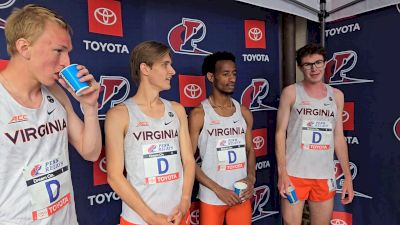 Virginia Second in Historic 4xMile at Penn Relays
Virginia Second in Historic 4xMile at Penn RelaysApr 29, 2024
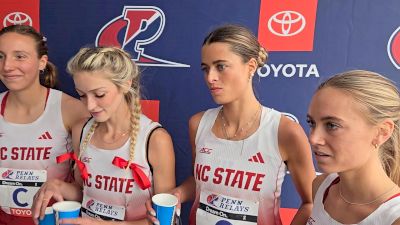 NC State Wins 1st Title in Penn Relays 4x1500m
NC State Wins 1st Title in Penn Relays 4x1500mApr 29, 2024
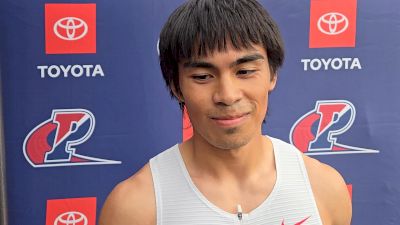 Louie Hinchliffe Continues Houston's 100m Legacy at Penn Relays
Louie Hinchliffe Continues Houston's 100m Legacy at Penn RelaysApr 29, 2024
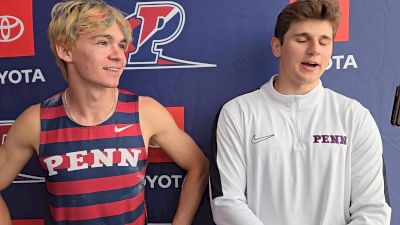 James Rhoads and Scott Toney 1-2 for Penn in Pole Vault
James Rhoads and Scott Toney 1-2 for Penn in Pole VaultApr 29, 2024
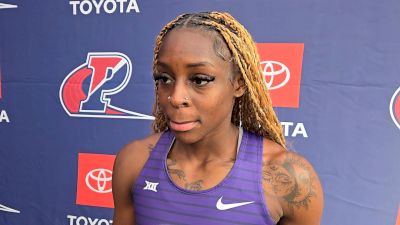 Iyana Gray TCU Wins Penn Relays 100m Championship
Iyana Gray TCU Wins Penn Relays 100m ChampionshipApr 29, 2024
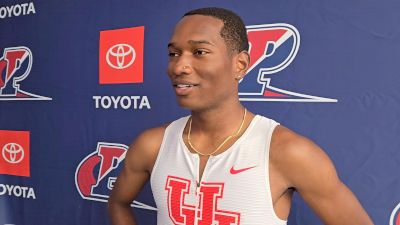 De'Vion Wilson of Houston Defends 110H Penn Relays Title
De'Vion Wilson of Houston Defends 110H Penn Relays TitleApr 29, 2024
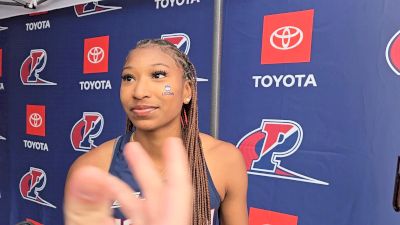 A'liyah Thomas of UConn Wins Penn Relays Long Jump
A'liyah Thomas of UConn Wins Penn Relays Long JumpApr 29, 2024
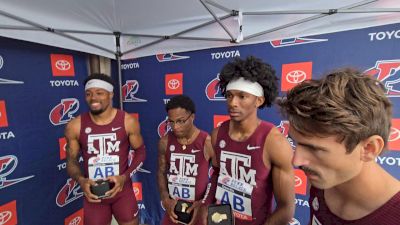 Texas A&M Wins Exciting 4x400m Championship of America
Texas A&M Wins Exciting 4x400m Championship of AmericaApr 29, 2024
 Villanova Smashes Collegiate Record at Penn Relays
Villanova Smashes Collegiate Record at Penn RelaysApr 29, 2024